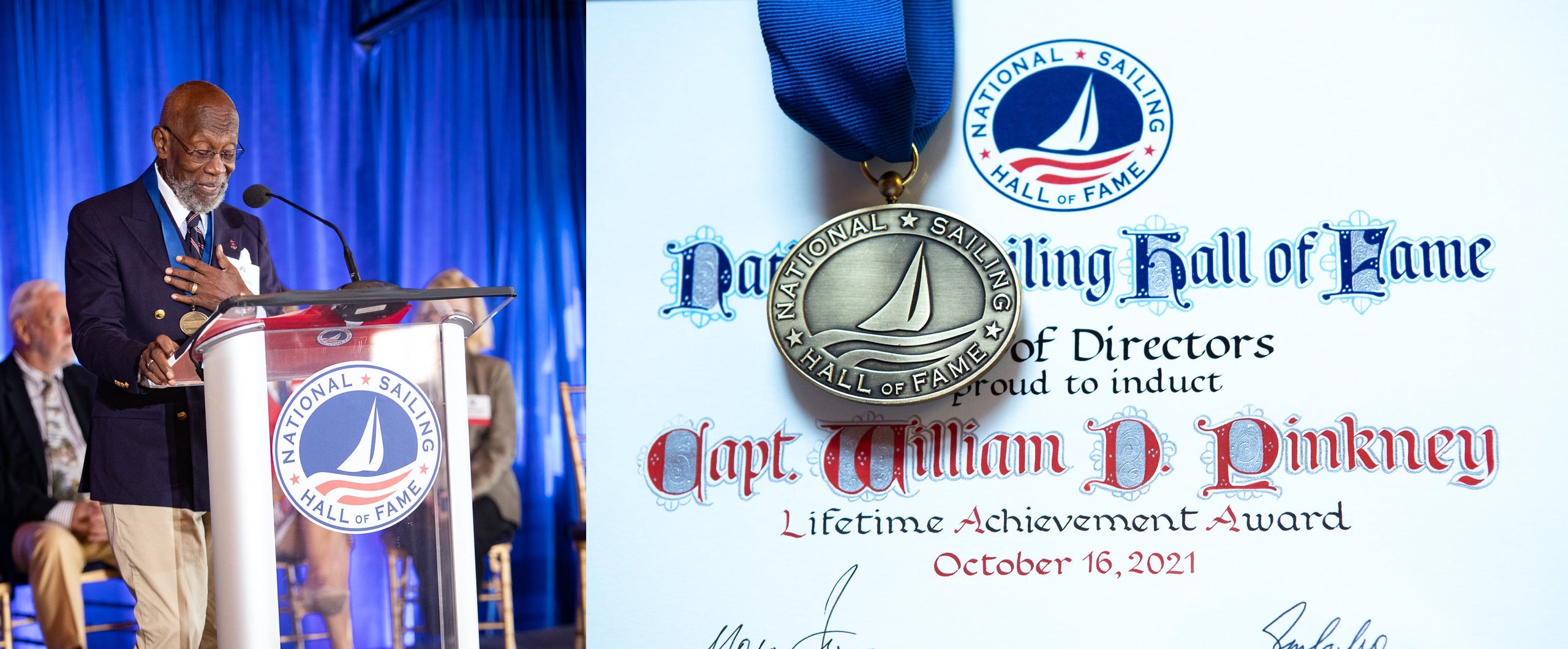
At The Helm
As the first Black American to solo-circumnavigate the globe, Captain Bill Pinkney sailed the world on his own termsA few weeks ago, Captain Bill Pinkney, renowned for his travels in the maritime world—among them as the first solo Black American to sail around the world (from 1990 to 1992)—was inducted into the National Sailing Hall of Fame and received its Lifetime Achievement Award.
It’s a life path that the young Pinkney might have had a hard time imagining at the age of 12, when he nearly drowned.
Even as a child, Pinkney was always drawn to the water. But back then, in his preteens, after jumping into Lake Michigan while with friends, he was shocked to find out that he couldn’t swim. A memorable event, the incident didn’t deter Pinkney who has long seen bodies of water as a kind of home, offering respite from the weariness of existence.
“It had an adventurous calling for me,” he explains of water. “It also was the one place where I felt that I could be, and none of the rigors and horrors of my life could follow me.”
A third-generation Chicagoan, Pinkney was born on the South Side in 1934 and grew up in Bronzeville, a 20th-century Black American cultural hub. Although he faced overt racism in the acutely segregated city, and at the predominantly white elementary school he attended, school later became the place where he fostered a love of reading. In the seventh grade, Pinkney encountered Armstrong Sperry’s novel, Call It Courage, which won the 1941 Newbery Medal. The story had a profound influence on him.
“I related to the young man in the book,” he says, describing the coming-of-age narrative of a Polynesian boy whose adventures included going from being intimidated by water to killing a wild boar. “I related to wanting to do that so much in the seventh grade, but it took me until I was 55 years old to decide that.”


After completing high school, Pinkney took a course to become an X-ray technician. Before he could utilize his training, he joined the Navy in 1956, where he fell even more in love with the water. When he was discharged from the service eight years later, Pinkney moved to Puerto Rico and began working mainly as an elevator mechanic, while successfully competing in limbo dance competitions on weekends. He was so good that he left the mechanic role to dance limbo for an entire year, returning to Chicago thereafter to take up “honest work” as an X-ray technician, taking to sailing on the weekends.

Back then, Pinkney sailed alone because he couldn’t always find the three other people required in many popular sailing races. Eventually, he purchased a 28-foot boat, and joined the Lake Michigan Singlehanded Society, participating in their 106-mile race. Apart from the solo races, he often just enjoyed his solitary company out at sea, relishing in the freedom he experienced in being there by himself.
Sparked by the desire to preserve something for his two grandchildren, in his mid-50s, Pinkney had an epiphany: He would travel the world by himself on a sailboat.
“I wanted to do something to leave as a legacy to my grandchildren. And I said, ‘Well I can’t leave them money, but I can leave them a benchmark to follow,’” he says.
At a reunion of his elementary school classmates prior to his departure, when Pinkney mentioned his plans to the principal at the time, the endeavor took on a life of its own. Before long, Pinkney’s around-the-world adventure became a part of the school curriculum in Chicago and Boston. His previously humble voyage had turned into a grand affair.
Altogether, Pinkney ended up communicating with more than 30,000 children via radio telephone and a satellite communicator that gave them his position six times a day. On the 47-foot boat he used on the trip, aptly called Commitment, Pinkney was out in the water for 22 months, from August 5, 1990, to June 9, 1992. He says his greatest fear wasn’t dying, but surviving and losing his boat—and having to restart the journey.
“Your biggest battle is not the sea; your biggest battle is yourself … because you learn about yourself, you learn about your resiliency, your fears, your demons, your dreams,” he says.
When he completed his voyage, Pinkney received a hero’s welcome, and not only from his family. There was a commemoration by the 102nd Congress, he wrote a children’s book, was invited to be a speaker around the country, and even received three honorary degrees. He notes that he has not made a fortune but has a “wealth of memories” that money cannot buy.
If you ask Pinkney what he would change about the journey and are expecting either a predictable “nothing” or a contemplative soliloquy, he’ll say instead that he would have liked to use a bigger boat. If you ask him what the Lifetime Achievement Award from the Hall of Fame means, he’ll remind you of why he embarked on the journey more than 20 years ago.
“I can sit back and say well, my accomplishment is something I did on my own, with the knowledge that I had, and the desire to do so. Not to prove anything except to show my grandkids that you can do more than you think you can,” he says—his words carrying the power to turn any skeptic into a believer.

- Images Courtesy of Carter Berg






